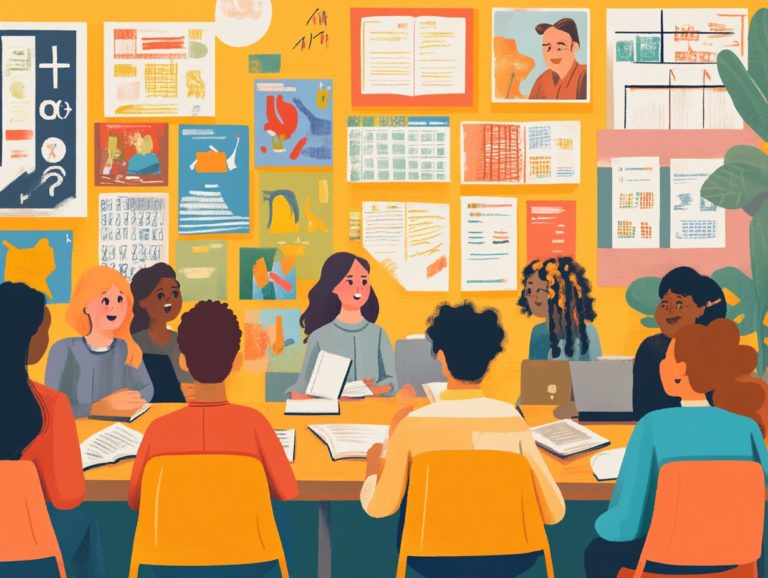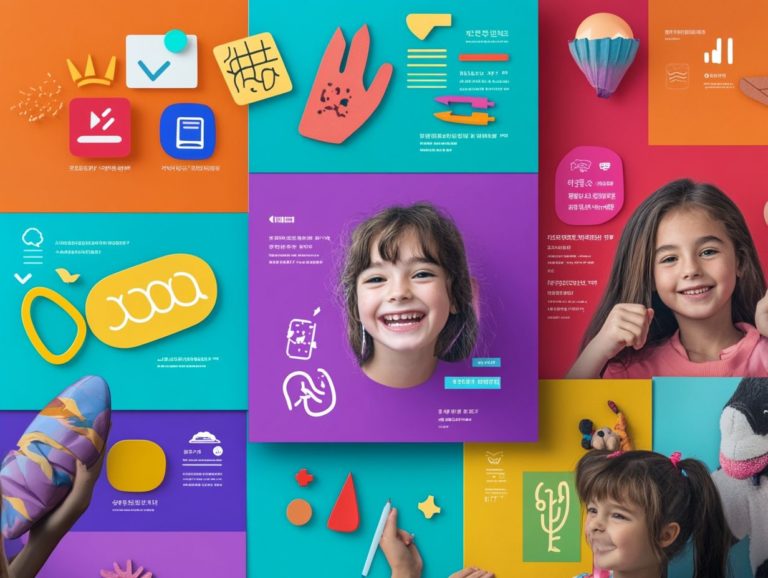The Benefits of Group Language Learning
Group language learning is a vibrant way to master a new language.
When you learn in a group, your motivation and accountability increase. You also enjoy richer social interactions and cultural insights.
Whether you’re just starting out or want to refine your skills, group learning can transform your language journey.
Contents
- Key Takeaways:
- Advantages of Learning a Language in a Group
- Choosing the Right Group Language Learning Program
- Tips for Success in Group Language Learning
- Maximizing Group Dynamics
- Overcoming Challenges in Group Language Learning
- Dealing with Group Dynamics
- Addressing Individual Learning Needs
- Frequently Asked Questions
- What are the benefits of group language learning?
- How does group language learning help with motivation?
- What are the advantages of learning a language in a group setting?
- Can group language learning be more cost-effective?
- Is group language learning suitable for all levels of language proficiency?
- What are the social benefits of group language learning?
Key Takeaways:

Group learning offers improved motivation and accountability, as students support each other. It also enhances social interactions, creating a well-rounded experience.
To maximize your program, consider class size, teaching methods, and group diversity.
What is Group Language Learning?
Group language learning means studying together with others. This approach allows you to practice speaking and strengthens your cognitive skills.
With interactive tools and a community focus, you embark on an exciting language journey. Your proficiency, cultural awareness, and communication skills will all improve.
The diversity in these groups encourages learning from each other. You can share tips, correct each other gently, and celebrate successes together.
Advantages of Learning a Language in a Group
Learning a language in a group offers many benefits.
The shared experience boosts motivation and accountability. It creates a dynamic atmosphere among peers.
In this collaborative environment, peer support enhances effective communication and cultural awareness.
You develop strong language skills and enjoy many chances to practice speaking while making meaningful connections.
Improved Motivation and Accountability
Motivation and accountability are key to a great group language learning experience.
When you work with others, you feel responsible for each other s growth. This fosters a rich environment for social learning.
For example, peer feedback sessions allow you to give and receive constructive advice. You can also form small study groups to share resources and celebrate successes.
Participating in group discussions and collaborative projects boosts your engagement. This transforms learning into a supportive journey.
This peer support not only enhances your motivation but also makes language learning more effective.
Enhanced Social Interaction and Cultural Understanding
Enhanced social interaction and cultural understanding are key benefits of group language learning. These elements allow you to connect with peers from diverse backgrounds and cultures, highlighting the benefits of learning multiple languages.
This interaction enriches your language education experience and fosters cultural awareness and appreciation among all participants.
Engaging in activities like role-playing real-life situations, sharing personal stories, or discussing cultural traditions helps deepen your understanding of different perspectives and practices.
For example, a conversation about local customs surrounding holidays can offer valuable insights into a culture’s core values. Collaborative projects might involve exploring shared culinary techniques.
These interactive dialogues boost your language acquisition while creating a space for mutual respect. This helps you navigate cultural nuances and celebrate diversity.
Ultimately, group language learning transforms into a vibrant tapestry of shared experiences, enriching both your language skills and cultural literacy.
Choosing the Right Group Language Learning Program

Selecting the ideal group language learning program is essential for unlocking the full potential of collaborative language education. It ensures you have access to flexible opportunities tailored to your unique needs.
With an extensive array of language classes available, including online options, choose a program that fosters effective communication and aligns with your personal goals.
Factors to Consider
When selecting a group language learning program, consider several key factors. The types of language classes, the effectiveness of teaching methods, and the program s community approach significantly shape your thinking skills and language proficiency.
The choice of teaching methods can greatly impact your learning experience. Immersive approaches often deliver superior results compared to traditional rote learning.
Pay attention to class sizes as well. Smaller groups encourage more interaction, allowing for immediate feedback and personalized learning experiences.
A program that actively engages with the local community offers invaluable opportunities for real-world practice, enriching your overall language acquisition journey. By taking these factors into account, you can choose a program that aligns perfectly with your learning styles and goals.
Tips for Success in Group Language Learning
Embrace effective study techniques now to transform your learning journey. A deep commitment to collaboration will enable you to fully capitalize on your educational experience.
Employing strategies that encourage engagement and teamwork can elevate your language learning experience and refine your skills remarkably.
Effective Study Techniques
Effective study techniques are crucial for mastering a language, especially in a group learning environment. Interactive tools can elevate your experience.
Methods like peer teaching, role-playing, and problem-solving activities significantly boost engagement and retention. Using these strategies fosters collaboration while allowing you to take an active role in your education.
In a peer teaching setup, grasp challenging vocabulary better through explanations from your peers, leading to deeper understanding. Role-playing scenarios allow you to practice conversational skills in a realistic context, yielding fluency and confidence.
Incorporating problem-solving exercises, such as group discussions on cultural topics, stimulates critical thinking and enhances communication skills.
Altogether, these approaches create a dynamic learning experience, enriching your journey in language acquisition.
Take action now! Explore group language learning programs and share your experiences to foster a community of learners.
Maximizing Group Dynamics
Maximizing group dynamics in your language learning setting creates an environment ripe for collaboration and peer support. These elements are crucial for enhancing your language skills.
Encouraging open communication and active participation allows you to tap into the wealth of diverse perspectives each learner brings. Adopting strategies like setting clear group objectives and defining roles can greatly boost engagement.
Icebreaker activities can also work wonders. They help build rapport with your peers and make everyone feel at ease sharing ideas and practicing their language skills.
When conflicts arise, using effective conflict management techniques like active listening and mediation ensures disagreements are resolved constructively, preserving a positive atmosphere.
Promoting inclusivity and being mindful of different cultural backgrounds enriches the overall group experience. This approach fosters a cohesive learning community where every voice is valued and heard.
Overcoming Challenges in Group Language Learning
Tackling challenges in group language learning can be exciting and rewarding! It’s important to navigate group interactions and address individual learning needs effectively.
Identifying and resolving these challenges creates a more enriching and effective language education journey for everyone involved.
Dealing with Group Dynamics
Understanding group interactions is essential for your success in language learning. With diverse personalities and communication styles at play, this understanding enhances your communication skills.
To manage these dynamics, foster open dialogues where every participant feels valued and heard. Collaborating on problem-solving helps address tensions from differing opinions.
Establishing ground rules for respectful communication can significantly elevate the atmosphere within your group. Techniques like active listening and paraphrasing reduce misunderstandings and cultivate mutual respect.
Prioritizing these strategies fosters trust, leading to more productive interactions and a supportive learning environment. Ultimately, this boosts your collective language proficiency.
Addressing Individual Learning Needs
Addressing individual learning needs bridges the language skills gap among diverse learners. Implement flexible opportunities and tailored teaching methods to meet each participant’s unique challenges.
For instance, differentiated instruction adjusts teaching methods to fit different learning styles. This might include incorporating:
- Visual aids
- Interactive activities
- Audio resources designed specifically for auditory learners
Design collaborative projects that enable learners at various proficiency levels to contribute based on their strengths. Peer mentorship, where more advanced students support beginners, further cultivates a nurturing learning environment.
Personalization becomes vital, ensuring that each individual comprehends the language while remaining engaged and motivated throughout the process.
Frequently Asked Questions
What are the benefits of group language learning?
Group language learning provides a social and collaborative environment for language learners to practice and improve their skills together, highlighting the benefits of learning languages at a young age.
How does group language learning help with motivation?
Group language learning fosters motivation through friendly competition and peer support, as learners work towards a common goal together. Don’t miss out on these valuable tips!
What are the advantages of learning a language in a group setting?
Learning in a group setting makes language practice lively. You get to engage in conversations and activities that boost your speaking and listening skills naturally.
Can group language learning be more cost-effective?
Yes! Group lessons are often cheaper than individual ones because the cost is shared among members.
Is group language learning suitable for all levels of language proficiency?
Absolutely! Group learning can fit everyone, from beginners to advanced speakers. By forming groups based on skill level, each member gets a tailored experience.
Group language learning helps you meet others who love the language and culture. This can lead to new friendships and exciting cultural exchanges!






